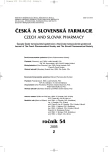Dispensing Care at the Dispensing Counter in the Conditions of a Czech Pharmacy
Farmaceutická péče za tárou v podmínkách české lékárny
Vyhodnocením 108 případů, kdy farmaceut zjistil potřebu provést zásahy do preskripce, bylo ověřeno použití mezinárodně používaného klasifikačního systému farmaceutických intervencí v podmínkách české lékárny základního typu. Poskytována byla tzv. farmaceutická péče za tárou po dobu šesti měsíců, studie se zúčastnilo pět farmaceutů (z celkového počtu sedmi v lékárně pracujících). Nejčastějšími identifikovanými problémy byly: nevhodné užívání léčiv – předávkování, užití v nevhodnou dobu (28,7 %), potřeba informovat pacienta (17,6 %), potenciálně neefektivní terapie (12,9 %), lékové interakce (7,4 %), suspektní a potenciální nežádoucí účinky indikovaných léčiv (7,4 %) a nedostatečná compliance (6,5 %). Řešení lékových problémů představovalo nejčastěji: změnu v dávkování (25,9 %), doporučení konzultace s lékařem (24,1 %) a odborné poradenství k farmakoterapii (23,1 %). Jako farmakoterapeutická skupina vyžadující nejčastější telefonický kontakt farmaceuta s lékařem byla identifikována antibiotika včetně antibakteriálních chemoterapeutik.
Klíčová slova:
farmaceutická péče – intervence farmaceuta – lékové problémy – preskripce – poradenství
Authors:
B. Macešková; H. Plevačová
Authors‘ workplace:
Veterinární a farmaceutická univerzita Brno, Farmaceutická fakulta, Ústav aplikované farmacie
Published in:
Čes. slov. Farm., 2005; 54, 70-74
Category:
Original Articles
Overview
Evaluation of 108 cases when the pharmacist found a need to intervene into prescription verified the use of internationally employed system of classification of pharmaceutical interventions in the conditions of the Czech pharmacy of the basic type. The so-called dispensing care at the counter was provided by five participating pharmacists (out of seven working in the pharmacy) for a period of six months. The most frequently identified problems included: inappropriate use of medicaments – overdose, use at unsuitable time (28.7 %), a need to inform the patient (17.6 %), potentially ineffective therapy (12.9 %), drug interactions (7.4 %), suspected and potential undesirable effects of prescribed medicaments (7.4 %), and insufficient compliance (6.5 %). Solution of problems with medicaments was most frequently: a change in dosage (25.9 %), recommendation to consult the physician (24.1 %), and professional counselling on pharmacotherapy (23.1 %). The pharmacotherapeutic group identified as the one most frequently requiring a telephone consultation of the pharmacist and the physician was antibiotics, including antibacterial chemotherapeutic agents.
Key words:
dispensing care – intervention of the pharmacist – drug problems – prescription – counselling
Labels
Pharmacy Clinical pharmacologyArticle was published in
Czech and Slovak Pharmacy

2005 Issue 2
-
All articles in this issue
- Pharmaceutical Hydrophilic Gels
- Adsorption of Substances on Active Charcoal – Part 3: Stobadin Acylderivatives
- Dispensation during Pharmaceutical Stand-by Duty Service
- Dispensing Care at the Dispensing Counter in the Conditions of a Czech Pharmacy
- Preformulation Studies of Potential Drug XIX M: Partition Coefficient
- Arbutin, Salicin: The Possibilities of Their Biotechnological Production
- Use of Dinitrophenols in Ion-Pair Extraction Spectrophotometry of Cationic Tensides
- Use of Capillary Isotachophoresis for the Determination o Pheniramine in Granulated Powders
- Pharmacoeconomic Profile of Antibiotics Used in the Treatment of Lower Respiratory Tract Infections in Geriatric Patients
- Effect of Polymer Concentration on Rheological Properties of Carbopol® 980 Hydrogels Containing Trimecainium Chloride
- Czech and Slovak Pharmacy
- Journal archive
- Current issue
- About the journal
Most read in this issue
- Pharmaceutical Hydrophilic Gels
- Use of Capillary Isotachophoresis for the Determination o Pheniramine in Granulated Powders
- Dispensing Care at the Dispensing Counter in the Conditions of a Czech Pharmacy
- Arbutin, Salicin: The Possibilities of Their Biotechnological Production
